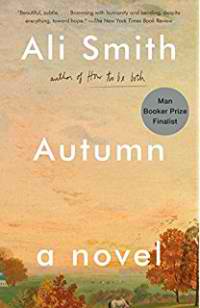Autumn by Ali Smith
 Monday, December 11, 2017 at 7:28AM
Monday, December 11, 2017 at 7:28AM 
First published in Great Britain in 2016; published by Penguin Random House/Anchor on October 17, 2017
Autumn is set in England, where “Thatcher taught us to be selfish and not just to think but to believe that there’s no such thing as society.” Issues like immigration and Brexit divide people, and it “has become a time of people saying stuff to each other and none of it actually becoming dialog.” Anger is worn like a shield and race hatred is prevalent. The news “makes things spectacular that aren’t, and deals so simplistically with what’s truly appalling.”
Against that backdrop, Daniel Gluck, having reached the age of 101, lies in a hospital bed, sometimes believing he’s on a beach littered with corpses, sometimes believing he’s inside the trunk of a Scotch Pine. Daniel once wrote songs that are no longer remembered. He seems unaware that Elisabeth Demand visits him daily, reading to him during the “increased sleep periods” that his nurses consider a prelude to death.
Elisabeth’s friendship with Daniel began when she was his 8-year-old neighbor. In flashbacks, we see Daniel as an aging man with an obvious interest in linguistics and art who imparts bits of wisdom dressed up in the kind of silliness that might appeal to a young girl whose mother is less than an ideal parent. Daniel taught Elisabeth how to make up stories that would help her understand the ways in which life can be shaped and the world can be changed. That makes him a pretty wonderful character, the opposite of selfish people who do not believe in society and prefer to shout their own opinions instead of listening to the opinions of others.
Daniel represents an earlier time, while Elisabeth, now a lecturer in art history, is just coming to comprehend the role that time plays in life. Daniel’s descriptions of paintings when Elisabeth was a child eventually lead Elisabeth to understand Daniel’s great secret, which helps her understand something about life. Through Daniel, Elisabeth becomes interested in the pop art of Pauline Boty, which leads her to contemplate Christine Keeler, who was central to the Profumo Affair. The sexual liberation that began in the 1960s came to be manifested in many ways, one of which is expressed by this thought: “A great many men don’t understand a woman full of joy, even more don’t understand paintings full of joy by a woman.”
Both Daniel and Elisabeth are perfectly drawn characters. Daniel is one of those gentle souls from a kinder era who dispense wise words in unexpected moments, drawing on their vast life experiences to apply the lessons they’ve learned to a new generation’s circumstances. Those characters exist in literature more than reality, but they are always a joy to encounter, in person or in the pages of a well-written story. We never learn much of Daniel’s life, but we learn enough to know his essence.
Daniel’s life is ending and, in a sense, Elisabeth’s is still beginning. By dealing with the mundane (repeated trips to bureaucrats who reject her passport photos because they do not match their precise requirements) and thinking about Boty, she learns to question the value of rules and norms of behavior, including rules that once defined the subservience of women, that are ultimately meaningless. She discovers that the past (Daniel’s song lyrics, for example) can be relevant to the present, even as people and events fade in and out of collective memory, to be lost and rediscovered, again and again.
Time flies, Daniel says, demonstrating by throwing his watch off a bridge. The past is replaced by the present which will be replaced by the unstoppable future. The immigrants who are reviled today will become the bedrock citizens of tomorrow. When so many people see change as something to be resisted, Autumn suggests that the march of time is to embraced, that the present and future can be shaped “with people’s histories and with the artefacts of less cruel and more philanthropic times.” But whether we can shape it or not, Autumn reminds us, time remains in motion. We can join it or we can be stuck. And if we join it, we can choose to bring the best parts of the past into the present, and to create the present in a way that will build a better future. Those lessons, taught in joyful and lyrical prose, make Autumn a valuable addition to the literature of time.
RECOMMENDED